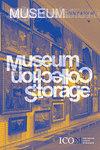重新想象大流行病中的博物馆:以新的治理为生、开放和可持续的博物馆
IF 0.4
4区 艺术学
0 ART
引用次数: 0
摘要
摘要通过案例研究,本文提出了发展一种情境博物馆学的必要性,使博物馆管理模式能够在转型或危机时期进行调整。它还为实施知识管理流程的必要性辩护,这些流程主张将博物馆实体的记忆系统化并记录下来,这反过来可以作为在危机中规划博物馆实践的基础。尽管非自愿关闭带来了挑战,但对于哥伦比亚卡尔达斯大学博物馆中心(卡尔达斯大学的博物馆中心)来说,疫情成为闭门评估25年持续工作的理想环境。关闭的博物馆该怎么办?机构的回应是开始一个内部评估过程,以重新想象博物馆在疫情后工作的未来时代。因此,博物馆中心在哥伦比亚政府文化部的资助下制定了一项新的博物馆计划。转向在线工作模式对不同组织层面使用的参与式方法的实施构成了挑战,例如合作壁画的创作、访谈和在线讨论。这些练习使人们能够整合博物馆的不同视角和愿景,并恢复失去的记忆,这有助于大学博物馆的新概念化。本文章由计算机程序翻译,如有差异,请以英文原文为准。
Re-imagining Museums in a Pandemic: New Governance For a Living, Open and Sustainable Museum
Abstract By means of a case study, this article presents the need to develop a contextual museology that allows models of museum management to be adapted in times of transition or crisis. It also defends the need to implement knowledge-management processes that advocate systematising and documenting the memory of museum entities, which can in turn serve as a foundation for planning museum practices amid crises. Despite the challenges caused by its involuntary closure, for Colombia’s Centro de Museos de la Universidad de Caldas (Museum Centre at the University of Caldas) the pandemic became the ideal setting to carry out, behind closed doors, an assessment of 25 years of continuous work. What should be done with a closed museum? The institutional response was to begin an internal evaluation process to re-imagine the museum in a future era of post-pandemic work. The Centro de Museos therefore developed a new museum plan, financed by a grant from the Colombian government's Ministry of Culture. Turning to online modes of working posed a challenge on the implementation of participatory methodologies that were used at different organisational levels, such as the creation of collaborative murals, interviews and online discussions. These exercises made it possible to integrate different perspectives and visions of the museum and to recover lost memories that contributed to a new conceptualisation of the university museum.
求助全文
通过发布文献求助,成功后即可免费获取论文全文。
去求助
来源期刊

MUSEUM INTERNATIONAL
ART-
CiteScore
0.60
自引率
0.00%
发文量
0
期刊介绍:
In its new revised form Museum International is a forum for intellectually rigorous discussion of the ethics and practices of museums and heritage organizations. The journal aims to foster dialogue between research in the social sciences and political decision-making in a changing cultural environment. International in scope and cross-disciplinary in approach Museum International brings social-scientific information and methodology to debates around museums and heritage, and offers recommendations on national and international cultural policies.
 求助内容:
求助内容: 应助结果提醒方式:
应助结果提醒方式:


